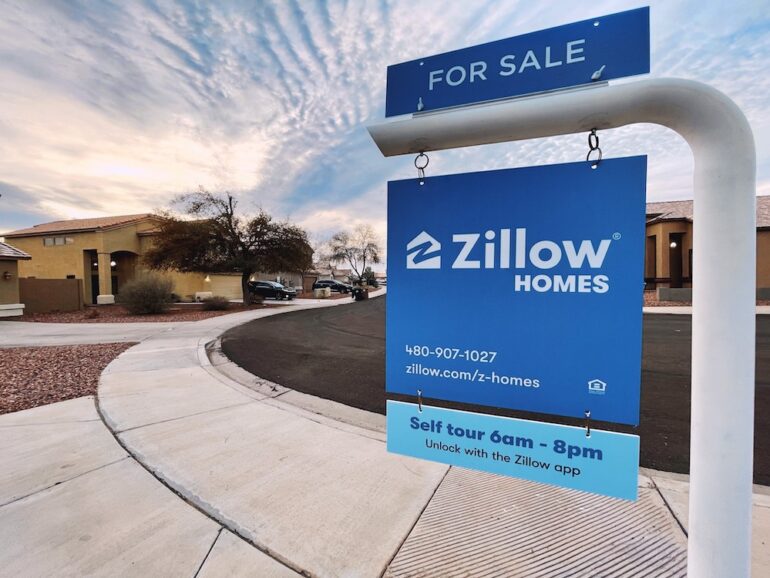TL;DR:
- Zillow Group embraces AI and machine learning to enhance real estate operations.
- David Beitel, CTO of Zillow, envisions AI as a key driver for simplifying home searches.
- The “Zestimate” algorithm, introduced in 2006, estimates home values with impressive accuracy.
- Generative AI advancements offer new opportunities for Zillow’s data-rich environment.
- AI transforms Zillow’s coding process, improving efficiency and code quality.
- Zillow experiments with AI to create natural dialogues and optimize marketing campaigns.
- The Showcase 3D tour product enhances property listings through AI-powered immersion.
- An AI-powered coding assistant aids engineers, fostering more efficient coding workflows.
- While automation and AI aid customers, real estate agents remain indispensable.
- Zillow’s venture into AI-powered home-flipping faced challenges but led to innovative shifts.
- Zillow focuses on building a comprehensive real estate “super app” post-challenges.
Main AI News:
In the rapidly evolving landscape of modern businesses, artificial intelligence (AI) and machine learning have emerged as transformative tools, reshaping industries across the board. Among those at the forefront of this tech-driven revolution is Zillow Group, an industry leader committed to harnessing the power of AI to elevate its real estate offerings.
David Beitel, the seasoned CTO of Zillow, envisions a future where finding one’s dream home is seamless and delightful, and he believes that AI holds the key to unlocking this vision. “Our goal is to simplify the process of discovering homes that resonate with people’s desires,” Beitel affirmed. “AI, undoubtedly, is a driving force behind this endeavor.“
On a recent rendezvous with GeekWire, Beitel elaborated on Zillow’s AI-powered journey from the heart of downtown Seattle. A founding member of Zillow’s ranks and former CTO of Expedia, Beitel’s insights offer a glimpse into the company’s AI aspirations.
Zillow’s tryst with AI dates back to 2006 when it introduced the “Zestimate” algorithm. This groundbreaking tool employs statistical and machine learning models to estimate the value of homes, boasting a nationwide median error rate of 2.4% for on-market homes and 7.49% for off-market ones. Beitel, however, sees untapped potential in the recent strides made in generative AI, particularly considering the vast troves of data Zillow manages. This AI leap also reverberates within the company’s coding ethos. “The horizons have expanded beyond our previous capabilities,” Beitel remarked.
CEO Rich Barton echoed the sentiment during Zillow’s earnings call, emphasizing AI’s role in propelling the company’s growth trajectory. Indeed, the integration of AI is set to redefine Zillow’s interaction with its audience.
Aiming to foster more organic and meaningful interactions, Zillow’s AI experimentation transcends traditional communication boundaries. “Our focus is to leverage our content effectively, fostering a dialogue that guides users and Zillow toward their ideal homes,” Beitel stated. The horizons of AI extend to Zillow’s marketing endeavors, too, aiming to optimize expenditure and streamline campaign research, planning, and content generation.
Beitel’s spotlight also falls on Zillow’s innovative 3D tour product, “Showcase,” which leverages AI to craft immersive property listings, underscoring Zillow’s commitment to an experiential real estate journey.
The AI-infused strides aren’t confined to customer engagement alone. Zillow’s engineering corps is undergoing a transformation with the introduction of an AI-powered “copilot” coding assistant. A pilot test with 200 engineers quickly turned into a full-blown implementation, with engineers adopting the assistant’s code suggestions a notable 40-to-50% of the time. Even senior and principal engineers attest to its efficacy, emphasizing the newfound efficiency in their coding workflows.
While automation and AI offer tantalizing prospects for Zillow’s customer base, Beitel stresses the indispensable role of human agents in the real estate domain. “We’re not seeking to replace agents,” Beitel asserted. Zillow’s revenue pulse, the Premier Agent program catering to real estate agents, remains intact. The mission now is to empower agents with AI tools that augment their interactions with Zillow’s users, streamlining processes and amplifying their expertise’s impact.
The journey hasn’t been without its share of setbacks. Zillow’s venture into AI-powered home-flipping through “Zillow Offers” encountered challenges, leading to its cessation in 2021. While AI-powered statistical modeling promised a revolution, the nuances of real-world dynamics proved formidable. Yet, Zillow’s resilience shines through. The company pivoted its focus to building a comprehensive real estate “super app,” dedicated to addressing every facet of the real estate journey, from buying to selling and renting.
In Beitel’s words, the tech industry’s landscape is a realm of calculated risks and enduring lessons. “Successes and lessons learned are all part of the journey,” he affirmed. “Innovation remains our compass, ever guiding us toward what’s best for our customers.“
Conclusion:
Zillow Group’s strategic integration of AI across various facets of real estate signals a transformative shift in the market. By leveraging AI to streamline customer interactions, enhance property experiences, and optimize internal processes, Zillow not only underscores its commitment to innovation but also sets a benchmark for the real estate industry’s future. This approach aligns with a broader market trend where tech-driven solutions are redefining traditional industries, emphasizing the significance of adaptability and customer-centricity in a rapidly evolving business landscape.

